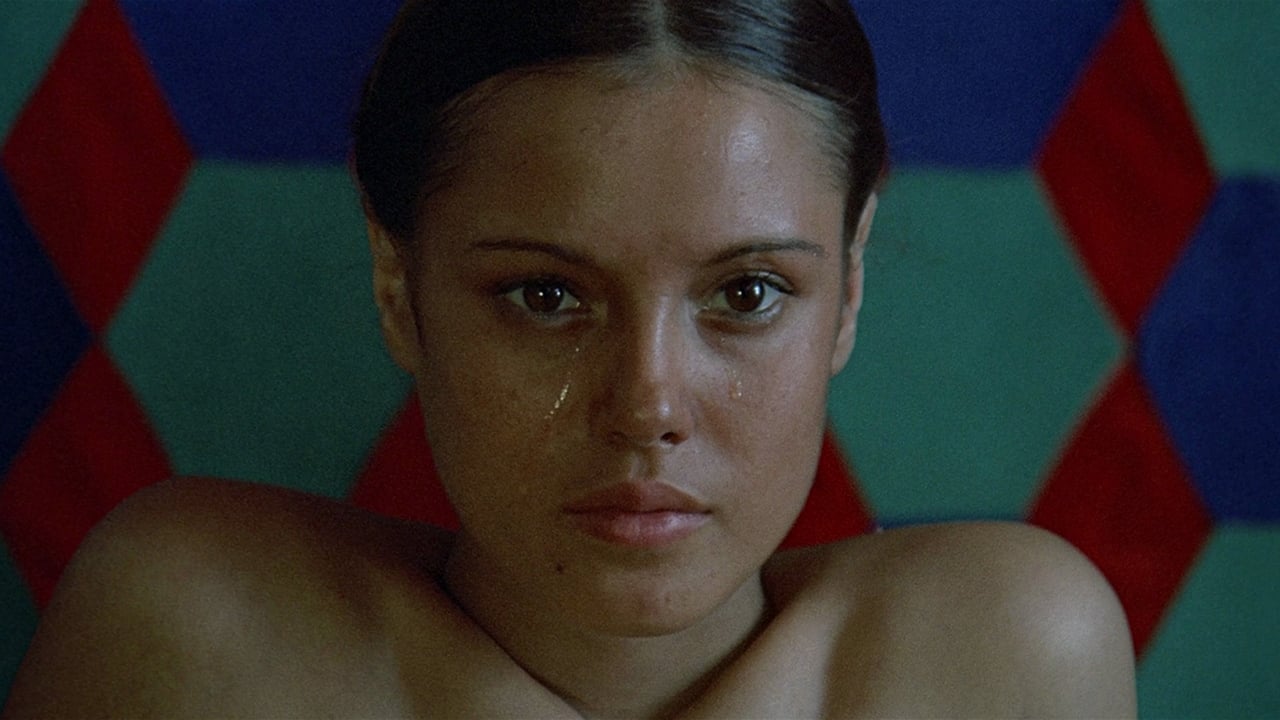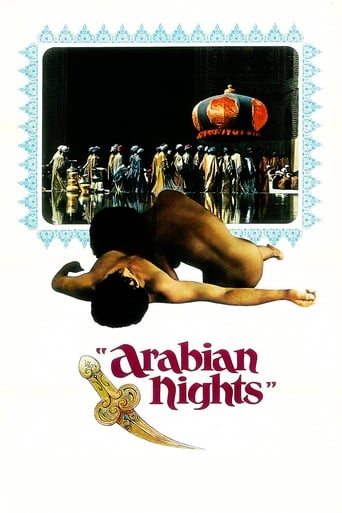

This movie has two main flaws.First, there is far more male nudity than appropriate or necessary for many of the scenes.Generally,no sooner does a male character appear than in the next frame he is either naked or there is a closeup of his genitals, not for any readily discernible reason.Secondly, the Italian dubbing is generally quite bad; the actors often sound like they are talking too fast and too loud.But ultimately these are minor quibbles.This film is totally unique and spellbinding.The settings are authentic , sometimes almost bizarre, and stunningly beautiful.We are afforded a glimpse into a completely new and different kind of world.The actors, too, are all very unique-looking, like a huge collection of character actors.The music sort of drifts in and out to great effect: when we do hear it it is often very muted , almost haunting snd other times there is complete silence, which somehow makes the scene especially striking.The cinematography is suoerb: the colours are very rich and the lighting ranges from brilliantly lit outdoors to shadowy and murky indoors, but it always looks natural.Special mention is deserving of some of the very striking images in the film like the crucifixions and the dismemberement.They are almost like paintings.Finally, the stories all flow and blend into one another very smoothly.Sometimes it is difficult to tell where one begins and the other ends.The plots of these stories are always interesting.They never get bogged down but keep moving forward and are full of twists that will make yoz gasp. Arabian Nights is a one of a kind masterpiece.
... View MoreResembling something out of an obscure dream, the characters from the ancient tales of the 1,001 Nights come to life in a dizzying spectacle of natural beauty, natural light, and the most breathtaking landscapes ever committed to film. Sumptously filmed throughout the exotic locales of Yemen, Ethiopia,Iran, and as far as Nepal, we are introduced to the story's hero, the sweet and innocent Nur Ed Din, played by the exotically beautiful Franco Merli, (Salo: 120 Days of Sodom.) While in the marketplace, Nur Ed Din encounters the enchanting Zumurrud, a feisty slave girl, being sold at auction. The girl has a spirit of her own and is given permission to choose who her next master shall be. Turning down generous offers from rich old men, she instead selects the young shepherd boy, Nur Ed Din, who is delighted to bring his new slave back to his home. He has not one dinar, but this matters not to Zumurud, who shows the boy the mysteries of eroticism. Of course Zumurud is stolen away after he ignores a prophetic warning from his slave, not to do business with a blue-eyed Christian. A greatly heart-broken Nur Ed Din embarks on an adventure to find his lost love, and this adventure is the centerpiece of this enormous, sweeping film. During his travels he meets many people, who all have their own tales to tell, thus taking the boy on still further adventures, where he encounters genies, giants, Princes, and heart-broken men in search of their lost loves. There are sequences in this film that are so beautiful that they induce chills, such as when Zumurud comes upon the kingdom in the desert, and is greeted by a brigade who name her 'King' of their castle, thinking that she is a man. Or when Nur Ed Din encounters the lion in the desert, and is led by the beast to an enchanted city where his beloved awaits. Featuring a minimal but beautiful score from Ennio Morricone, the predominant sounds are the desert winds, and innocent laughter of children. Rather than employ professional actors, Pasolini wisely uses locals, many who possess the most natural and innocent kind of beauty imaginable. Natural performers who can hardly resist giggling shyly when doing a nude scene. This is a world where sex is portrayed completely without Western guilt, and Pasolini even veers away from the rigid sexual codes of Islam, to bring these magic tales to life, suggesting perhaps that these tales are older even than religion itself. Erotic scenes that come across as playful, some even featuring erect penises, (a rarity in mainstream cinema,) and yet it all still comes off as strangely innocent and utterly pure. If the fantastic tales don't dazzle the viewer, than certainly the cinematography and the beautiful, lush costumes will surely boggle the mind. This is what cinema is really about; a creation of a fantasy world so real, and glorious enough to take one out of reality, and on a great adventure. This must truly have been something to behold on the big screen. "Arabian Nights" was the final film of Pasolini's "Trilogy of Life" collection. A year later he would embark on the first film of his "Trilogy of Death" series. He would not live to see the final editing of his "Salo: 120 Days of Sodom," a film considered by some to be the most offensive and controversial film of all time. Some say that he was murdered because of the contents of that film. But see "Arabian Nights," a true celebration of life and the human spirit.
... View MorePasolini film is always a Pasolini film. This is visually the most beautiful one Pasolini ever made. Filmed in Yemen, Ethiopia, Iran and Nepal, so it gives a great background to the Arabian Night- stories. The movie is quite loosely based on the original stories, but you can find them there anyway.Better known movies, Il Decameron and I Racconti Di Canterbury started the "Trilogy of Life" -trilogy, that this movie ends. Every of these three movies, is based on classic erotic literature. Directors homosexuality shows on the screen too. After this one he finished his last movie before getting murdered, Salo, which is the most revolting and sick movie ever made.Il Fiore delle mille e una notte shows you beautiful landscapes and buildings, much naked men and women, but pretty naive acting and stories. Fun to watch, but not as interesting as it should.
... View MoreThis very unique rendering of the Arabian Nights was filmed in natural locations in places as diverse as Ethiopia, Yemen, Iran and Nepal. The beauty of the landscapes is breathtaking, and makes the film an incredible voyage into time and space. Please note that this movie is an explicitly erotic one, but one tends to forget that the original Arabian Nights were very much so, and not fairy tales for children. It is certainly difficult to make an erotic masterpiece, as sexual content does not make a movie better. It rather tends generally to get crassly exploitative, and rarely beautiful. There is plenty of sex in this movie, but it is depicted in a natural, feel-good and intelligent way that is rarely to be found elsewhere.By the way, this movie should be seen again at the light of nowadays controversies. The Muslim world was far from always having been puritanical, and the sensual poetry that is rendered here is not Pasolini's invention. It is the faithful reflection of a hedonistic Orient that produced for instance poet Omar Khayyam as well as the original Arabian Nights. It is also a film about love, the most gripping part being the tragic and mysterious tale of Aziz and Aziza.Don't expect any Aladdin or Ali Baba stuff here, you already figured this out. Anyway, it would be impossible to make a complete film version of the Arabian Nights, so this work just shows a few excerpts combined together (the Italian title is in in fact "the flower of the Arabian Nights"). However, the trend of the tales is respected in the sense that all the stories are interwoven into one another and eventually come back to the original plot. The atmosphere of ancient Orient is rendered in a style that is lightyears away from usual clichés, and in an incredibly authentic and physical way. At times, you get the illusion that you feel the blazing sun on your skin, that you can smell the exotic vegetation, the sand, the noisy bazaars full of spices. There are a few flaws though : visible cutting, unadapted stances of classical music. The use of non professional actors was common for Pasolini, and gives a pleasant feeling of naive freshness.The movie is probably Pasolini's best, and belongs to the "trilogy of Life" that included "the Decameron" and "the Canterbury tales", also literature classics. But much more than the two others, this movie is an ode to life. Hard to suspect that Pasolini's last work would be an ode to death. "Arabian Nights" belongs to the golden age of Italian cinema, that was incredibly prolific and innovative in the sixties and seventies.All in all, not a family movie, but if you are curious and open-minded, get ready for a beautiful journey.
... View More